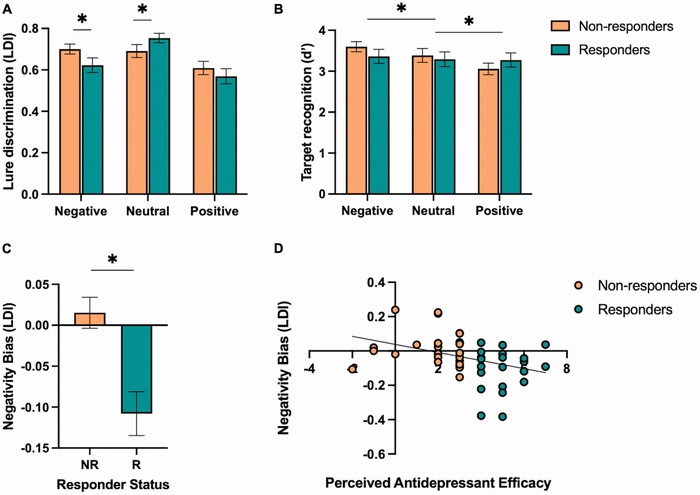But don't go all Ozempic and rush to find a boutique physician willing to prescribe them for you, no one knows how antidepressants work, even after 70 years in existence. Though they outperform placebos like supplements in GNC or other alternatives to medicine, alternative medicine is such a scam because the threshold for placebo is high. Antidepressants are far better than supplement alternatives even though they only work 50 percent of the time. That is why patients routinely have to try a few.
How they work is unknown at this time, but it is important that they do. Often science can converge on the how by seeing where things occur. That is why a result showing that antidepressantscan shift memory dynamics toward healthy function is intriguing.

Performance on the emotional mnemonic discrimination task in antidepressant responders versus non-responders. (A) Low similarity lure discrimination index (LDI) performance across negative, neutral, and positive stimuli in responders (R) and non-responders (NR). (B) Target recognition performance across negative, neutral, and positive stimuli in R and NR groups. (C) Negativity bias in LDI (e.g., negative – neutral / negative + neutral) across R and NR groups. (D) Correlation between perceived antidepressant efficacy and negativity bias in LDI in R and NR. Asterisks indicate a significant interaction between emotion and responder status (A), significant main effect of emotion (B), and a significant group difference across responder status (C).
It is only a pilot study, 48 participants ages 18-35, who were surveyed and had been actively taking antidepressants (regardless of the type of antidepressant and diagnosis) for at least one month prior to participation in the study. A follow-up study is currently being conducted to examine how the brain responds to antidepressants.






Comments